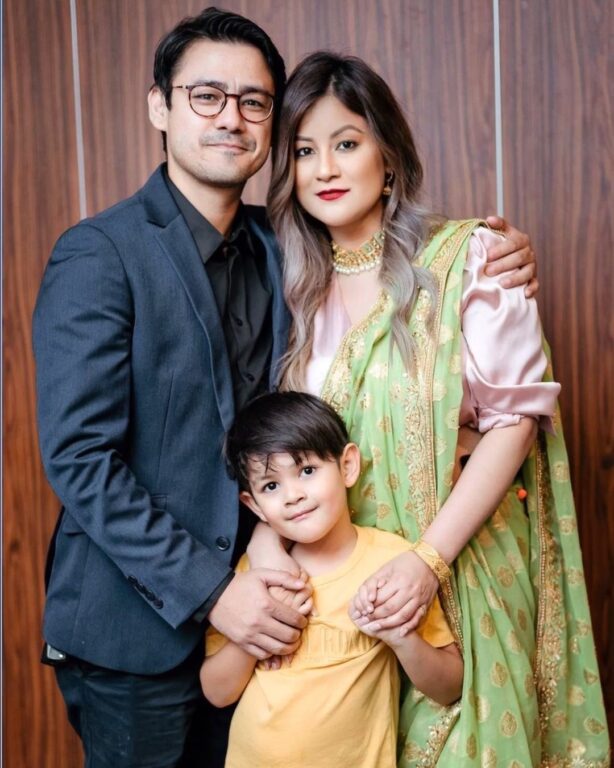
Today is Ashtami (8th Day of Dashain celebrations) – in Nepal, holidays have begun, many have returned home to their families, and almost everyone is immersed in celebrations. But celebrations aren’t limited to Nepal – are they? What about millions of Nepalis who live abroad? They are seen observing the festival too – IG posts of families dressed in traditional attire, stories of good food, and videos of people getting together and having a memorable time – NSW’s lockdown could not have ended at a better time – thanks to millions who rolled up their sleeve and got their jabs.
This Dashain, we got an opportunity to talk to Payal Shakya – former Miss Nepal, a cancer awareness ambassador, and a prominent social figure in Nepal and Australia. We were curious how she, and her family celebrate Dashain in Australia.
Nepalese Voice: What do you miss the most about home, or Nepal, during Dashain?
Payal Shakya: I miss Dashain as a whole. I miss waiting for Dashain to arrive – the anticipation of my parents buying us new clothes is something I miss. I miss flying kites with my brother and sister. I miss the environment created by the festive mood of Dashain, especially the aroma in the air that screams loudly when Dashain has arrived. Playing cards, hanging out with cousins, enjoying delicious food, and collecting Dakshina from elders. Celebrating Dashain while growing up in Nepal brings different emotions and experiences all together.
Nepalese Voice: Can you share a little bit about your first Dashain experience in Australia? How was it? And how much celebrating Dashain has changed since then?
Payal Shakya: I came to Australia back in 2006. I still remember my first Dashain away from my parents, friends, and family. It was bittersweet and unpleasant as it was my first time celebrating away from my family. Sarun was my only family here back then along with his brothers and sisters-in-law who were already here. They made sure I did not feel sad or left out by organising a Tika and Dashain get together.
Back then there were not many Nepali stores in Australia and we had to go to different suburbs to buy Dashain related materials. But now you can get almost everything as many suburbs in Sydney have Nepali stores and since then, Dashain items have become more widely available.
Around 2006 to 2008, there was a significant growth of Nepali students coming to Australia to pursue their studies and career. Now, there are also many Dashain parties in clubs where people can catch up and enjoy Dashain through music and dance, bringing young people together who are missing their families and loved ones back home. Dashain brings people together in the community and brings happiness, joy and a break from their busy lives.

Nepalese Voice: How do you celebrate Dashain in Australia? Does Sahas look forward to celebrating Dashain every year?
Payal Shakya: We catch up with Sarun’s parents, his two elder brothers and their families, my brother and his family on Tika day and have a big feast, enjoy music, play games and spend quality time together.
Sahas, our son, has always been curious about Dashain, Tihar and all the festivals that we celebrate. We make sure that he understands the significance behind each festival so that he values all festivals while growing up.
We try to make him understand the main reason to celebrate this festival is because Dashain is a great victory of gods over wicked demons. We try our best to make Sahas experience similar emotions we used to feel while growing up in Nepal. I know it won’t be the same, but we put our effort into the experience and memories so as he can cherish them for his lifetime.
Nepalese Voice: With NSW meeting its vaccination targets, and restrictions most likely to be eased – do you have any special plans for Dashain this year?
Yes, most definitely. We are really looking forward to receiving blessings from elders in the form of tika and Jamara.
We will be catching up with our family on Tika day as we do every year. This Dashain is going to be very special and memorable for us as we will be catching up with our family after almost three months of lockdown.
Sahas is really looking forward to seeing his cousins and grandparents. He is literally counting the days. Every year we visit my in-laws’ (Sarun’s parents) place. They cook the most amazing and delicious Newari food. Celebrations start from the afternoon and end at night.
For Nepalese, Dashain is not only a one day festival, it goes on for days where we catch up with our friends and family to exchange warm wishes and spend quality time.
Nepalese Voice: How has the last two years (living with Covid-19) been for you and your family? What positive experiences have you drawn from the situation?
Payal Shakya: The last two years living with Covid-19 has been a learning experience for us.
What I have realised is time is very precious and we often don’t spend it with our loved ones. We get so busy running in the rat race that we don’t realise that we are missing out on so many things that really matter and are valuable.
During this past year, the Covid-19 pandemic has upended our lives, and changed not just the way we live and work but also how we think and behave. All parts of the world have been affected, and every aspect of life has been impacted.
While we stop and look at the world around us, I cannot help but realise that I used to take things for granted. One life lesson that I learnt during this pandemic is that ‘Life is Precious’, and we need to be be grateful for what we have.
Nepalese Voice: For many, living under Covid-19 restrictions has had an adverse impact on mental health – would you have any message for them?
Payal Shakya: Covid-19 not only affects us physically, but it has also left a big mental health cost – individually, and collectively. We constantly worry about the safety of oneself, our friends and family. Sometimes, we have to isolate from our loved ones – which causes anxiety, amongst other mental health problems. Lockdowns are also said to contribute to mental health problems.
I believe that acknowledging one’s feelings goes a long way towards diminishing overall impact on our mental health. It is normal to feel sad and become anxious during these circumstances.
Talk to your loved ones, stay connected, avoid negativity by not watching excessive amounts of news. Make sure to exercise, do what you love the most.
Take this as a challenging time but also as an experience to discover yourself and your inner strength. This time will also pass but make sure to make the most out of it.
Nepalese Voice: When you want to send Dashain dakshina to your siblings, or cousins back home – what channel do you use to send money home? And why?
Payal Shakya: Sending money back home, especially during Dashain, is really special as it gives us the feeling that we are still connected and we can be part of the celebration of our loved ones back home.
I used to surprise my parents with gifts by arranging them through my friends in past years. But now I have realised that it is always best to send money so that my parents can buy whatever they want and need.
I have been using the money transfer service WorldRemit and have been really satisfied with the service. It is reliable, safe and easy to use. I have downloaded the WorldRemit app and every time I need to send money back home, it is just in the palm of my hand and my parents receive money instantly. This Dashain as well I have used WorldRemit money transfer services to send money to my family.
Nepalese Voice: What message do you have for Nepalis living in Australia, and for Nepalis back home this Dashain?
Payal Shakya: As we are fighting pandemic and the lockdown in Australia, it is very important to make sure to check on yourself, your family and loved ones back home.
Whether you have a small and simple celebration or a lavish and huge celebration, make sure to spread happiness, have a good time and be safe.






